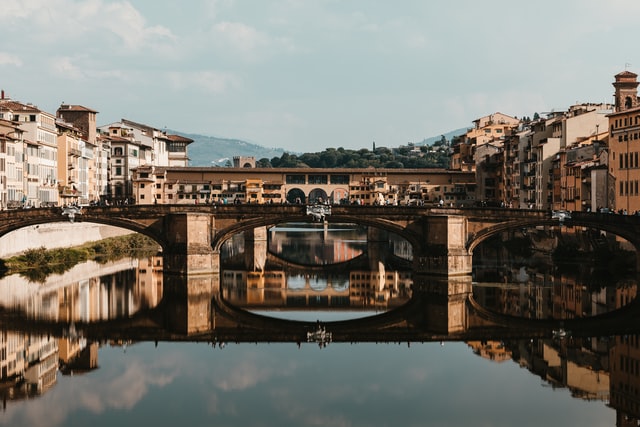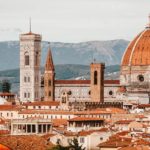Travel Florence: Museum and Street Music Adventures


Jarl hadaken t a book along which he read, not paying attention to me. I started watching Middle Eastern and African men in the courtyard in front of the museum selling knock off Gucci and Coach purses, copies of famous paintings, sunglasses and other trinkets. Some of them had their merchandise lying on sheets, others had pieces of cardboard set up at angles and on top of each other to create makeshift tables.
They all suddenly picked up their merchandise, grabbing the corners of the sheets, throwing the sack over their shoulder, collapsing the cardboard tables and slipping the pieces under their arms. They melted away into the crowds on the side street, which cut through the open air corridor across the courtyard from me, all within just a few moments. I put my headphones on and listened to the Beatles, drowning out the voices in the line.
Two policemen, or Polizia di Stato, the state police who keep public order, came strolling through the street. They wore navy blue trousers and light blue short sleeve shirts with captain style white hats. Their hands casually rested on their guns at their waist. After the Polizia were gone, the vendors slowly reappeared, sliding back from the side street that intersected the courtyard, popping out of the crowd. I watched one African man lay out his sheet, carefully arranging the purses in an attractive manner, separating each of them out of the pile.
The Middle Eastern man with the sunglasses set up his pieces of cardboard into a table, propping open on top the three-fold piece that the sunglasses were attached to. Two Middle Eastern men spread out their replicas of famous paintings, several of them were of Boticelli’s The Birth of Venus, of which the original is inside the Uffizi museum. They leaned some paintings against the columns of the corridor across the courtyard from me, making them easier for people passing by to see. An African man wearing cargo pants with leg pockets large enough for a loaf of round bread to fit into, laid out his sheet and carefully arranged African statues, putting the larger ones in the back.
“Here comes the sun/ here comes the sun/ and I say/ it’s all right…” blared in my ears.
These groups of men did not have all their merchandise set up for more than ten minutes when they suddenly and quickly all packed up again and slipped away onto the side street, but this time not completely disappearing into the crowd. They stood where they could see the Polizia walk by.
I could still see their heads popping nervously among the tourists. The same two Polizia casually walked past. They appeared to be going on a loop, walking by every fifteen minutes or so. After they were gone, the men came back and picked a place to set up again. They went through the same process of setting up and organising their things. Tourists walking by stopped to look at the items for sale.
The man selling African statues had a tourist woman at his sheet who was holding one of the larger statues that was made of black wood and was two African people standing together. The rest of the man’s comrades suddenly began to pack up again. The man watched them, his body language uneasy, shifting his weight as he kneeled next to the woman who was inspecting the statue. He clearly wanted to pack up too and made motions towards starting to move the statues into a pile, but also appeared to not want to interrupt the sale he was likely going to make.
The woman was oblivious to what was happening behind her–the other men packing up and leaving, this man wanting to pack up, and the Polizia coming. He ran out of time to move and ended up staying put. The Polizia walked by, not paying the slightest bit of attention to him. The woman bought the statue and walked away. The other men came back and began to lay out their things again, going through their familiar process. I looked away; we were almost at the front of the line to walk into the museum.








